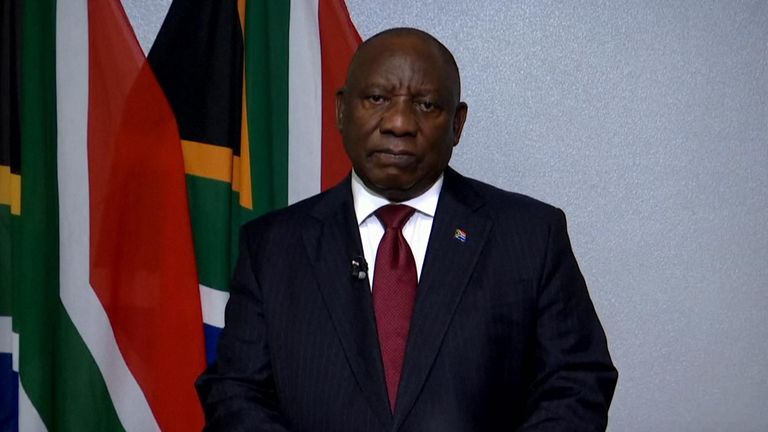As the interim ruling of the International Court of Justice (ICJ) on South Africa v Israel was read out in the Hague, South African President Cyril Ramaphosa was wrapped in a Palestinian keffiyeh watching with the leadership of the African National Congress in Johannesburg.
When the verdict finally landed, he turned and hugged the Palestinian deputy ambassador Bassam Elhussiny.
The South African delegation in the Hague in the Netherlands also celebrated – and their rejoice was formalised in a statement by South Africa’s Department of International Relations and Cooperation (DIRCO).
It read: “Today marks a decisive victory for the international rule of law and a significant milestone in the search for justice for the Palestinian people.
“In a landmark ruling, the ICJ has determined that Israel’s actions in Gaza are plausibly genocidal and has indicated provisional measures on that basis.”
Follow latest: ICJ ruling a ‘major blow’ to Israel
In a state address that followed, President Ramaphosa said: “Some have told us to mind our own business. Others have said it was not our place. And yet it is very much our place, as people who know too well the pain of dispossession, discrimination, state-sponsored violence.”
Is this the victory that South Africa says it is?
The ICJ stopped short of ordering a ceasefire but did call for a series of emergency measures to be implemented.
The measures include ordering Israel to take all steps within its power to prevent genocide and report back to the court within one month.
While the 17 judges consider the genocide allegations – which may take years to rule on – South Africa asked the court “as a matter of extreme urgency” to issue an interim order compelling Israel to suspend military operations to protect Palestinians in Gaza while the case proceeds slowly through the court.
Those who support South Africa’s case strongly feel the measures sanctioned by the ICJ on Friday require a cessation of hostilities in order to be actionable by Israel – with a reporting mechanism that provides evidence which will go towards the ongoing genocide case.
At the steps of the Peace Palace in the Hague, where the ICJ read out their ruling, Dr Naledi Pandor, South Africa’s minister of international relations and cooperation, echoed this to an international audience.
“No way that I’m going to say I am disappointed. I hoped for it [a ceasefire] but the act of delivering humanitarian aid, the fact of taking measures that reduce the level of harm against persons who have no role in what Israel is combatting – for me – requires a ceasefire.”
Read more:
What is genocide and why has South Africa taken Israel to court for it?
‘Hague schmague’: Minister dismisses world court
Met reveal cost of policing Israel-Gaza protests
While the ruling was announced, Dr Ashraf Al-Qudra, the spokesman for Gaza’s ministry of health, said the number of deaths it had recorded in the territory due to Israeli attacks since 7 October had risen to 26,083 with 64,487 injured.
Patrick Kadima, international law expert at the University of Witwatersrand in Johannesburg, said: “It is a huge victory for South Africa on the international stage.
“The provisional measures that have been granted give some moral and legal backing to pursue enforcement in the international community.
“I do also think that the court could have done more. It could have done more in terms of the ceasefire provisional measure. I think that is a huge blow.”
If the ICJ had sanctioned a ceasefire, its implementation would depend on a vote by the 15 members of the United Nations Security Council.
The United States vetoed a UN resolution in December which demanded an immediate ceasefire in Gaza. It was backed by all other Security Council members, except the UK which chose to abstain.
All countries on the council get one vote, but the US is one of five countries, with the others being China, Russia, France and the UK, which have the power to veto resolutions.
This story originally appeared on Skynews




